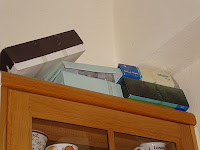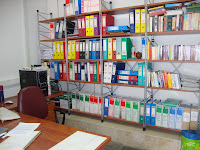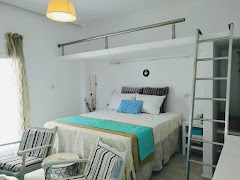I've said it before, and I'll say it again: "The past is a different country; people did things differently then"
When I got up in the morning of the 22nd of February, I woke up the kids and got breakfast going, like I do every weekday, But I did something unusual that morning: I turned on the computer (I usually do that at work, not at home). My husband needed a photocopy of a document that had some important bureaucratic value, and I needed to make a copy of the announcement for the new fiction lending library that I had created at work. I suppose you must be wondering why I couldn't do that at work since it's work-related:
don't you have photocopiers at work? you exclaim reproachfully, possibly even condescendingly, as a sign of Greek backwardness? Well, yes, we do, but they aren't working at the moment, because they all need toners (or something), and 'consumable accessories' (as we call them in Greek: αναλώσιμα) now have a low budget priority (toilet paper included:
BYO); the economic crisis has become a scapegoat for anything that goes wrong in our life.
The important document and the special announcement suddenly lost their importance when I was greeted with a bombarded Christchurch on the screen. My immediate thoughts went out to my family, who I felt were probably safe and sound in Wellington, hundreds of miles away from the stricken city. Christchurch is unfamiliar territory for me: I had never visited it, so I had never seen the famous
Cathedral or the
Timeball; they are now both history. At any rate, they were an earthquake risk before the earth moved in Christchurch, a place that no one had
ever thought of as a seismic region until the two quakes struck. It's amazing to think that we can put satellites in the sky, keep track of the movements of every single object on earth, know when a flood or a snowstorm will strike, warn people of when a volcano will erupt, and even prevent the spread of cancer by finding out how to stop malignant tumours from growing, but we still haven't figured out when an earthquake will strike, or how big it will be. Nature is still an unknown quantity, despite the great steps we have taken in our advanced evolution.
Unfortunately for Christchurch, luck was on their side when it struck the first time, making her inhabitants and the authorities somewhat
complacent about the possibility of an earthquake of similar magnitude striking again, and so soon. But it did, and it caught not just NZ, but the
whole world by surprise, and sadly for Christchurch, it created not just a local disaster, but a national state of emergency. When the first quake struck, I thought
How lucky NZ is that she didn't lose any lives. I didn't care that some of the buildings had been destroyed (and I was reprimanded for this by some of my kiwi compatriots). At the time the second earthquake struck, I thought
I can't do anything to help those people and that city:
I couldn't go and cook them some comforting food, I couldn't help search for survivors, I couldn't provide them with temporary accommodation. I felt so helpless. I went to work and tried to put the whole affair out of mind: I couldn't do anything about it. I simply reminded myself to
seize the moment: I had left one seismic region (
Wellington) to live in another seismic region (
Athens,
Hania), and this could happen to me at any time.
Over the last two weeks, as I pour over the photos showing the devastation that took place and skim through the hundreds of news reports that are still being written about the catastrophe, it occurs to me that Christchurch and her inhabitants (
those that have remained) are about to experience life in what up until now has been termed a
third-world (or under-developed, or developing, or simply 'poor') country, without having to actually travel to one. Apart from the sad loss of young life that the city has to deal with, there is also the loss of the historical buildings of Christchurch which gave the town her character,
buildings that had little value apart from the nostalgic, historical and sentimental, things that connected the people of Christchurch to their past, things that were promoted as
of particular interest for tourism.

While I was reading these reports, I heard a crashing sound in the living room: my daughter had been throwing a toy up in the air and catching it. At one point, it didn't fall into her hands; it fell on a few boxes on top of a shelf where I had decided to store them. They were filled with some crystal glasses (whose shape, style and appearance I abhorred), stuff that my mother (and some acquaintances) had bought (cheaply or on sale). They had never been used. Well, one of those boxes moved, which sent another one crashing down, which then created a domino effect, and the rest is history. I spent a good hour or two making sure no shards of glass remained on the floor; we don't use footwear indoors.
My daughter got a bit of a fright: she knows from experience how most mothers will react to such damage. She looked a little dazed when I kissed her - and slightly stunned when I
congratulated her on what she did. "Thanks for helping me to get rid of this crap from our house," I said to her. "I'm so glad it won't be left behind for
you to have to store in
your own home." It was at this point that I suddenly realised just what it was that I could do for my fellow compatriots, despite the great distance that divides me from them.

I came to Greece 20 years ago with a few clothes in a backpack, and some camera rolls full of memories of a European holiday. It was my first time away from home, and I was at a young and carefree age when material possessions did not mean much to me. My first flat was a furnished bedsitter in central Athens. It contained a tiny cooker, a small fridge, a double bed (supported on pallets), a tiny bathroom, three (rickety) chairs, a clunky old TV set, a small desk, 2 bookshelves, and some old (stained) crockery and cutlery. That's all I needed. When I went back home to visit my very ill mother, I felt sorry for her as I watched her dusting a myriad useless objects in the big huge family home (with a 25-metre hallway) with the too-many unoccupied (and unvacuumed) rooms, now that the flock had outgrown the nest. I couldn't tell her that, of course: she had arrived in NZ as an immigrant, and had come from a world where the few material possessions that one had were very important.

When I got married, I thought this was a good time to start amassing things myself, because I was about to start living in a large comfortable house, which I will most likely be living in forever (on the subject of
divorce, see the end of the post), and there was plenty of space to start filling up. So I took all my late mother's remnants, which reminded me of her, stuff which I thought I could show to my kids and tell them that the yiayia they never knew had bought it. Adding this stuff to my own and my husband's, before long, I'd filled up my new house with...
more stuff, which, thankfully, I now have the foresight to know I do not need to keep.
My family unknowingly helped me to do this. It started off a few months into my marriage, with my old clock radio (in perfect working order), which my parents had presented to me as a gift when I got my School C. It didn't have an inbuilt facility to keep the set time and alarm, so every time we had a power cut (this happens somewhat often in the villages of Hania), I had to re-set the time. But I didn't always remember to re-set the alarm, so every now and then, my husband got a rude awakening when the clock's factory settings turned the radio on at midnight. Can you blame him for picking it up and --- (I don't need to explain the rest).

Then there was the lamp, one of those beautiful tall old-fashioned ones, with a large tassled canvas tent lampshade surrounding the light bulb, supported on NZ wood, with a little table at chair-seat level, which could hold your cuppa Bells tea (over the crochet doily that every Greek woman would have placed on it). I'll never forget unpacking it in my father's apartment when he moved to Greece after the death of my mother: The shade took up
one whole storage box in a ship container. He didn't have enough space to put it in his new home, a tiny urban Cretan apartment, so I took it. One evening, I came home from work and found it broken. I couldn't blame my kids for the damage - they weren't even born yet. When I asked my husband for an explanation, he told me that a cat had jumped on it. "But we don't have a bloody cat, Dimitri." Apparently, a stray came into the house and he used it as target prac--- (I don't need to explain the rest).

The glass-topped table makes a good story. It was one of those tables made of fake word, with a fake carving of a (probably fake) Oriental scene. Any Greek-Kiwi would know the ones I mean: most of their parents would have at some time owned one, too, possibly with the same carving on it (Farmers sold it when it still had a furniture department). When my husband was faced with his first babysitting assignment with two babies, I should have expected that something would go wrong. On returning home from work, I didn't notice the missing glass from the top of the table. I simply asked how the evening went. "It was a bit adventurous," he replied. To cut a long story short, one of the children (not quite 2 yet) was playing in the lounge while the other one (10 months old) was in bed. Babies don't go to sleep when you tell them to; this one was fussing. Pity she was fussing when the phone rang: the sound of a phone is usually more important than the sound of a baby (from a man's point of view: and vice-versa from a woman's). She continued to cry, but he only stopped talking on the phone when he heard a loud crash coming from the lounge. The toddler had just smashed the glass table top with a toy telephone; my husband quickly removed him from the scene and took him to the children's bedroom. Just at the moment that his baby daughter saw her father, she stopped crying - and puked all over her cot. That was an expensive phone call, wasn't it?

There's also the story of the calculator my parents bought me in 5th form, one of those old ones with an LCD screen and rubber buttons. It was still in working order, but we have calculators on our computers and mobile phones, so it had fallen into disuse. That's why I didn't notice it missing from its hiding place. My son had found it and took it apart (including removing every single button) like a little Einstein, but didn't have enough genius left in him to re-assemble it. I have plenty more similar stuff-related stories to tell you, but they seem so trivial. It did not take me long to realise that all this clutter - the kind of stuff you can now buy on
Etsy - was just a way for me to cling to my past, because that is what I have generally been taught to do most of my life, from both my Greek and NZ upbringing: to remember my ancestors, to remember my traditions, to remember my history, to remember my country(s), to hold on to the past, lest we forget it and it slips out of our minds. But at the same time, that is why my present homeland is being persecuted: Greece is being forced to give up her past in order to face a more promising future. Now it's New Zealand's turn: Christchurch has to put
people's safety before the rcovery of possessions, and not worry about
how many school days pupils have missed out on, or
how many business days a store has lost, or how quickly
the city will be rebuilt. That's what happens in a disaster, whether natural or man-made: order breaks down, but chaos need not ensue.
Getting back to my mother's early life, why were those
few material possessions that she had so important in those days? They were important precisely because they were so
few, and in those days, they were
irreplaceable - in her mountain village of
Kambi, there were no shops (or even money) to buy new crockery if you broke it, or shoes if your only pair had holes in them, or socks or dresses (or even the materials needed to make them, for that matter). Nowadays, everything is replaceable, and at a very speedy rate, and a very low cost compared to life in the past. It really was a different country back then.

I now live in a comfortable home with all the necessary facilities. It's probably bigger than the average-sized home in Greece. At the same time, it's smaller than even the average-sized home in New Zealand. I don't own many kitchen appliances: when the multi-moulineux (or the toaster) breaks down, I use a knife (or make non-toasted sandwiches). When my kids grow out of their clothes, I give them away to others that need them (just like others did when they gave me
their kids' clothes). I've taught the children to give up their toys when they decide that they have grown out of them: they know where the bag is kept where we deposit items that we know we don't need any more. I buy as many books and DVDs from Amazon as I can afford, but I am now wary of the amount of space that books and DVDs take up, hence my decision to start a lending library for our students.

When I look at the
Acropolis, standing tall over Athens in its recently reconstructed state, I think it is a wonder that it's still standing, given the number of times man-made desecration has defiled it; not even
nature's forces could be so catastrophic! It's been rebuilt more for political rather than cultural reasons: we're still trying to prove to the UK that we are worthy of getting back the Parthenon marbles. When a well-known Nazi-erected historical monument in Hania,
the Eagle, suffered damage after a heavy storm only a few years ago, a whole clunk of it containing the actual bird fell down. It was never dismantled when the Germans left Crete, but now that it's been destroyed due to natural causes, no one thought about reconstructing it, either. It's over; we've moved on from that.
Houses in Vathi, Hania, Crete. They were razed by the Nazis in retaliation against the resistance movement. People lost their homes which were never re-built - some of the occupants of these houses moved to New Zealand.
It took a destructive earthquake for most Kiwis to realise that life is not all about
collecting Toby jugs and other
replaceable material possessions, nor is it about
saving old buildings at the expense of lives. If a building is to be demolished because it poses a safety risk, then the sooner the better; it doesn't need a
nationally-based enquiry to make the decision. In a city where, now, everyone knows someone who has passed away,
survivors need to keep in mind that they didn't lose their own life; surviving an earthquake is much easier than
surviving as a refugee. The old monuments (
with their old secrets) may have gone, but there will be
new ones to
take their place. What matters most is safety, not nostalgia. As long as you don't suffer from Alzheimer's, you'll always have memories to hold on to, but
you may not always be safe.
I leave you with a little something that I saw flashing across the screen last night on TV, as I was watching a music show, something I don't often do, so I take it as a divine sign that must be shared:
Μη μετράς την ζωή με αυτά που έχασες - να την μετρήσεις με αυτά που σου έμειναν. (Don't measure life by what you have lost - measure it by what has remained.)
On divorce: not for everyone, I'm afraid.
The photos of: the Cathedral, the Timeball, the radio, lampshade, table and calculator have been lifted off the internet.
©All Rights Reserved/Organically cooked. No part of this blog may be reproduced and/or copied by any means without prior consent from Maria Verivaki.








